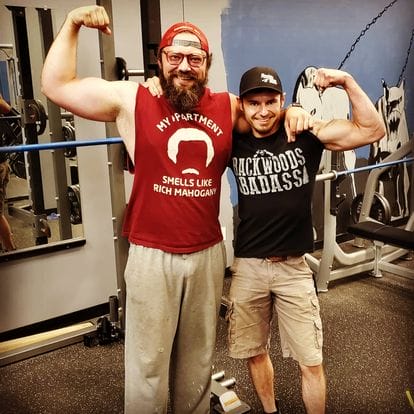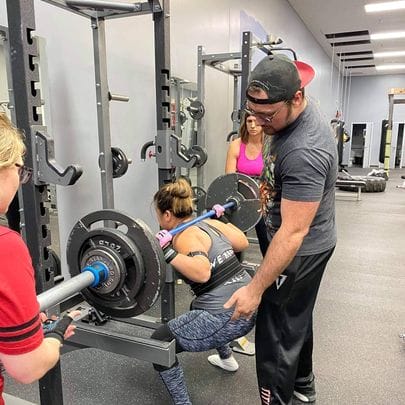Joshua Shepherd lifts more than weights, he lifts spirits and his community. Overcoming his own battles with mental health, fitness, and disordered eating, Josh is a beacon of light in his Illinois town. He is known as the “self-taught fitness guy” who can relate to his clients, allowing him to form lifelong friendships with those he coaches. With a background as a former bodybuilder, a unit program fitness manager in the military, and a certification from ISSA, Josh draws on his personal experiences for motivation both in and out of the gym.
When it came time to start at a new gym, Josh needed to have his own insurance policy. He came across Insurance Canopy and felt it was the best fit for him. There were a few times Josh called in with questions about his coverage, so we were excited when he answered our call to answer our questions about his business.

Q: Every personal trainer has their own unique way of training their clients. How would you describe your training style?
A: I consider myself more of a coach than a trainer. I don’t think there’s anything wrong with being a trainer, those people excel at their careers and are a huge help to the people who work with them. But, sometimes people need more than that.
I am a huge mental health advocate, and my journey with fitness is very closely intertwined with my mental health journey. I’ve been in those low places and I know how critical it can be to have someone to listen and support you, someone who understands you. The clients who I work with need that added support.
As a coach I try to make sure my clients physical and mental health is in check. We talk about their lives, because fitness usually takes a backseat when you’ve got stressful things going on in your personal life. If something else might be an issue for a client, I have a network of people I can reach out to or refer to them.
If I have a client who’s complaining a lot about certain aches or pains, I can consult with a physical therapist or chiropractor to see if there is something else we can do to help them. Or if someone mentions needing a referral to a good counselor, I can give them a list of people to check out.
This allows me to build a strong relationship with my clients, and we can be open and honest about life. It helps me teach them how fitness can fit into their lives, even when other things seem to be going wrong.

Q: What are some of the hardest parts of coaching, and how do you overcome them?
A: One of the hardest parts of coaching people is the thought process behind it. Trying to change someone’s mindset of fitness isn’t easy. You can’t get someone to stick with a healthier lifestyle if they just keep doing the same things they’ve been doing.
You have to be able to change the way they view fitness, think about their food, and even how they should view themselves. I don’t want to put people down or make them uncomfortable, so it takes a lot of vulnerability.
Another struggle is trying to train when I’m sick. If I’m not feeling well, or if my mental health isn’t doing good, I’m not in the right mindset to be training someone. The same goes for my clients. If they’ve had a hard day, maybe the last thing they want to do is a workout.
I once had a client who I could tell was on the verge of tears. I ended up having her meet me at a bar down the street and she was able to just talk through what was on her mind. We didn’t get a workout in, but we made positive progress with her mental health and her relationship with fitness.
I like to try to practice what I preach, and take a break when I can tell my mind or body need it. Then it’s back to business as usual. I will always communicate this with my clients, and in turn they have done the same with me. I see they are more motivated to get back on track and push through the hard stuff when they give themselves breaks every now and then. Sometimes it’s okay to take breaks, as long as you get back on track later.

Q: What do you love most about being a fitness coach?
It’s very important to me that I give back to my community and help support those around me. I have my talents with training, so why not share them and use them for good? A lot of my buddies in the area also love supporting local causes, so we have made it a priority to give back to those in need.
Occasionally we will host fitness events that raise money for someone in our community who needs the support, and a lot of us contribute to an emergency fund that we use to help people. There’s also some motorcycle groups I’m part of, and those are some of the most caring and giving guys you’ll ever meet. Over the years, we’ve collected and donated over $60,000 to people in need.
I don’t think I’ll be a fitness coach for the rest of my life, but I do still see myself being involved with my community and charitable efforts because that is what matters most to me. Ultimately, I want to keep helping people and changing their lives in whatever capacity that looks like. I want to make sure that in 5 or 10 years from now I am still happy with my career and doing something that I love.
I’ve also started training other coaches, and I do enjoy passing on my passion for helping others through fitness. I think if I can have a positive impact on how other people train their clients, I will feel like I’ve succeeded in making a difference in the fitness world.

Q: Every personal trainer has their own unique way of training their clients. How would you describe your training style?
A: My biggest advice to other trainers is just to be honest and transparent with clients. People can tell when someone is being fake. If you’re sick, going on a trip, or just need a break, let them know that and offer to reschedule with them or send them some workouts they can follow on their own.
I had a moment where I knew I was going to be getting back surgery and I had to prepare my clients for that. About a month or two before the surgery, I started making plans for my clients to follow while I was in recovery. I let them know they could text or call me at any time, but I would be there for them, even if it was from my couch.
I was able to still retain all my clients during that time, and I really attribute that to the relationships I’ve built with my clients over the years. I ended up coming back from recovery to even more clients who had shown interest in working with me after seeing how I worked with my clients throughout my recovery time. People really want a coach they can work with one on one, someone who won’t give up on them and will be there for them when they need some extra encouragement.
You also don’t want to make promises you can’t keep. Be honest from the get go and know your limits. Also know your client’s limits. Don’t promise someone that you will help them reach their goal weight by a certain time, because they will expect that and then be upset when that doesn’t happen.
Sometimes I have clients let me know that they need to take a day or a week off for a mental health break. I never just leave them hanging, I always offer to help them or see if they need a friend. Taking the time to develop those close relationships with clients just makes your life and theirs so much easier.
Want to learn more about Josh’s work? Check out his Facebook page today! You can also learn more about the personal trainer insurance policy that Josh, and thousands of other trainers, trust in every year.




